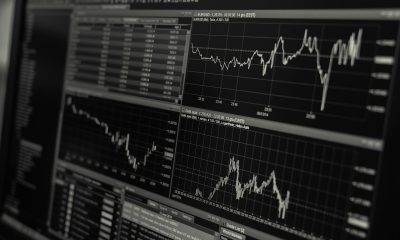Business
No Major Spanish Bank Was Affected by Credit Suisse’s Collapse
Although there is no exposure of the large Spanish banks to Credit Suisse, there has been a contagion in the share prices. The six Spanish entities listed on the Ibex have registered significant losses dragged down by the banking crisis unleashed by the Swiss bank, in addition to those already unleashed by Silicon Valley Bank. Banco Sabadell fell more than 10%.

New turbulence in the European banking sector. Just when it seemed that the banks were beginning to recover from the collapse of Silicon Valley Bank, a new bank collapsed. Credit Suisse plummeted 25% in the stock market on Wednesday due to the refusal of its largest shareholder to put more money into the bank and doubts about its accounts, which led the bank to ask for 50 billion in aid from the Swiss Central Bank. This situation has led the European Central Bank to ask all Eurozone institutions to reduce their exposure to Credit Suisse.
Read more about the collapse of Credit Suisse and find the most important financial news of the day with the Born2Invest mobile app.
Financial sources assure that no Spanish bank has material exposure to the Swiss bank
Credit Suisse is classified as a “systemically important financial institution” under international banking rules created after the collapse of Lehman Brothers in 2008. However, the ECB wants to keep the situation under control and therefore wants to know the risk of the entities in the Swiss bank. It cannot be ruled out that in the coming days, the different financial companies will close positions on Credit Suisse.
However, sources familiar with the situation of the large Spanish banks assure El Independiente that there is no exposure to Credit Suisse either through the entities themselves or through the funds. The same sources explain that the Swiss bank has been having problems for many months, so any position that could have been held previously will have disappeared during this time.
Without revealing the figures for the moment, the exposure of Banco Santander is “absolutely immaterial”, and that of BBVA is “insignificant”, and with regard to CaixaBank, sources in the know point to an “irrelevant” exposure.
Therefore, these sources rule out that there will be “big scares” with the collapse of Credit Suisse, although they recognize that there is some nervousness with the banking sector. This concern came with the bankruptcy of the Californian bank SVB, which, although it has a very different business model to that of Spanish banks, has made them look closely at where they are investing the excess liquidity that has been generated this year with negative interest rates.
“There are tensions to know in which assets have been invested and the magnifying glass has been placed on the weakest, which is Credit Suisse, due to the problems it is dragging along”, these sources assure. They also point out that Spanish banks “are solvent and with solid results” and recall that they have passed stress tests by the European regulator “which have stressed them to the maximum” and they have come out well.
Credit Suisse’s collapse caused a sharp fall due to the refusal of its largest shareholder to increase its stake
The Saudi National Bank, Credit Suisse’s main shareholder, has indicated that it will no longer support the Swiss bank. The Saudi group took a 9.9% stake in Credit Suisse last year in the capital increase it launched at the time. The Middle Eastern entity invested 1.5 billion Swiss francs (€1.53 billion).
“The most obvious risk is for Credit Suisse, which has been suffering from its own problems for some time. Its share price is at historic lows and has lost 70% of its value since the beginning of 2022. The bank is struggling to regain the trust of its clients after a dismal Q4 earnings announcement and a net loss for the full year 2022 of CHF 7.3 billion,” says, Jérémie Boudinet, Head of Investment Grade Credit at La Française AM.
Although there is no exposure of the large Spanish banks to Credit Suisse, there has been a contagion in the share prices. The six Spanish entities listed on the Ibex have registered significant losses dragged down by the banking crisis unleashed by the Swiss bank, in addition to those already unleashed by Silicon Valley Bank. Banco Sabadell fell more than 10%.
Credit Suisse CEO Ulrich Körner said they are “a strong bank” and that they meet and exceed all regulatory requirements. “Our capital and liquidity is very strong,” he said in an interview on Channel News Asia. In addition, the entity explained on its social network Twitter that its 2022 financial results “are accurate and reliable and are supported by a transparent audit opinion from its external auditor.”
Generali Investment explains that European banks also suffer from increased investor scrutiny, but overall “appear better positioned than their U.S. counterparts on various risk and valuation measures.”
ECB meeting
This banking earthquake came a day before another meeting of the European Central Bank. Christine Lagarde, president of the supervisor, announced a few weeks ago that rate hikes were to be prolonged and that those at the March meeting were to be 0.5%. However, some analysts point out that the central bank could change its mind due to recent events with European banks.
Financial sources close to the ECB say that everything points to a 50 basis point increase, but it is not yet finalized. However, the message they will send at the meeting will be that the roadmap of new hikes that had been set will have to be slowed down. With this, the market faces an unknown quantity this Thursday.
__
(Featured image by Fred Romero CC BY 2.0 via Flickr)
DISCLAIMER: This article was written by a third party contributor and does not reflect the opinion of Born2Invest, its management, staff or its associates. Please review our disclaimer for more information.
This article may include forward-looking statements. These forward-looking statements generally are identified by the words “believe,” “project,” “estimate,” “become,” “plan,” “will,” and similar expressions. These forward-looking statements involve known and unknown risks as well as uncertainties, including those discussed in the following cautionary statements and elsewhere in this article and on this site. Although the Company may believe that its expectations are based on reasonable assumptions, the actual results that the Company may achieve may differ materially from any forward-looking statements, which reflect the opinions of the management of the Company only as of the date hereof. Additionally, please make sure to read these important disclosures.
First published in EL INDEPENDIENTE, a third-party contributor translated and adapted the article from the original. In case of discrepancy, the original will prevail.
Although we made reasonable efforts to provide accurate translations, some parts may be incorrect. Born2Invest assumes no responsibility for errors, omissions or ambiguities in the translations provided on this website. Any person or entity relying on translated content does so at their own risk. Born2Invest is not responsible for losses caused by such reliance on the accuracy or reliability of translated information. If you wish to report an error or inaccuracy in the translation, we encourage you to contact us.

-

 Fintech5 days ago
Fintech5 days agoMuzinich and Nao Partner to Open Private Credit Fund to Retail Investors
-

 Crowdfunding2 weeks ago
Crowdfunding2 weeks agoSwitzerland’s Crowdfunding Market Remains Stable – Without Growth
-

 Crypto10 hours ago
Crypto10 hours agoBitcoin Traders on DEXs Brace for Downturn Despite Price Rally
-

 Business1 week ago
Business1 week agoDebt-Fueled Markets, Zombie Corporations, and the Coming Reckoning
























